- Home
- A. S. Byatt
The Children's Book Page 19
The Children's Book Read online
Page 19
“You could sell them. Supply them. To architects and people. They’d make lovely hearths. It could be a steady income.”
Geraint was only fifteen, but he was in a perpetual anxiety, bordering on rage, about the absence of a steady income. He mentioned the tiles to Frank Mallett when he went for his history lesson. He asked Frank if he knew anyone who might need tiles to decorate a house, or a church. He said that if only there was a place to show the tiles—in Rye, in Winchelsea, in London, how did he know? But he knew it must be possible to find a way. My father is so impractical, said Geraint. He’s an artist, he doesn’t make things people can buy. But these tiles Philip has made look very nice and can be repeated, they say, over and over. Papa says they are very original. They may be, I don’t know. But I do know people will like them. Only how will they see them?
Frank and Dobbin discussed the matter with Geraint over luncheon. It was Dobbin who had the bright idea of enlisting Miss Dace. She would know people who might be prepared to display a few tiles—very elegantly—in a bay window, or in the window of an art shop, or even a shop that sold fashions. In the end, they might make their own window. Maybe even a London showroom. Dobbin thought back to the Todefright midsummer. He said that Prosper Cain had been there, from South Kensington. He himself had seen Benedict Fludd’s work in the Museum, a wonderful vase, and a kind of dish. Maybe Major Cain might help? When he first came to Purchase House himself, he had hoped to be able to suggest a community there—like Edward Carpenter’s, but different, centred on the art of ceramics. If all went well, he said, delicately skirting the question of Fludd’s problematic temperament, might not Major Cain send funding, and students who would assist, and provide knowledge about buyers for a new range of ceramic work?
Geraint said it all depended on Philip Warren, whether it would last, this time. He had got the kiln going, and designed the tiles.
Dobbin said he was sure Philip would stay, if there was work for him.
And food, said Geraint, and even a living wage. Nobody seems to have thought about that. My family thinks it is vulgar to think about money, they think it is too low a thing for them to attend to—but I know there isn’t any. There really isn’t any. They can’t buy clay, and they’re in debt to the farmer for milk and eggs, and I have to charm the shopkeepers in the most disgusting way to have tea, or coffee, or meat. He brightened. “We might offer the butcher some of the tiles, for his display, in exchange for meat. I am not a vegetarian by choice. I like meat.”
11
In November 1895 Olive Wellwood was great with child. She sat at her desk in her usual flowing robes, which still concealed her condition from visitors and small children, and tried to write. She found it hard to write when she was “expecting;” the stranger inside seemed to suck at her energy and confuse the rhythm of sentences in her blood and brain. Part of her wanted simply to sit and stare out of the window, at the lawn, flaky with sodden leaves, and the branches with yellow leaves, or few, or none, she thought, taking pleasure at least in Shakespeare’s rhythm, but also feeling old. She took pleasure, too, in the inert solidity of glass panes and polished furniture and rows of ordered books around her, and the magic trees of life woven in glowing colours on the rugs at her feet. She never got used to owning these things, never saw them simply as household stuff. They were still less real than the ash pits of Goldthorpe. They still had the quality Aladdin’s palace must have had for him and the princess, when the genie erected it out of nothing. She kept trying to write a story with the title “Safe as Houses,” which would be ironic, because houses were not safe, like the Three Little Pigs’ foolish constructions of straw and wattle, or the house in the Bible builded upon sand. Houses were builded upon money, and Humphry had quarrelled with his rich brother, and abandoned his solid job amongst the ingots in the Bank in Threadneedle Street. Her ever-inventive mind played like light over Banks and turf banks, straw, sand, wattle and square-cut quarried stone, but the story would not come, it was not ready, and she was not ready to inhabit her fear of dispossession.
She loved Todefright as much as she loved any living being, including Humphry and Tom. When she thought of it, it had always two aspects, its carved and crafted presence, doors, windows, chimneys, stairs, and the world she had constructed in, through and under it, the imagined, interpenetrating world, with its secret doors into tunnels, and caverns, the otherworld under the green fairy hill. She imagined her home standing on terrifying strata of underground rocks and ores—flint and clay, coal and schist, basalt and grit, through which snaked rivers and branching tributaries of cold water and gleaming ores—liquid silver and gold—she always imagined them liquid, like quicksilver though she knew they were not.
All writers perhaps have talismanic phrases which represent to them the force, the intrinsic nature of writing. Olive’s was from the ballad tale of True Thomas, who had been taken under the hill by the Queen of Elfland.
For forty days and forty nights
He wade thro red blude to the knee,
And he saw neither sun nor moon,
But heard the roaring of the sea.
She wanted to write that—the wading through blood—the absence of sun and moon, and the roaring of the sea—but she had never done so, for her tales, though they were getting darker and stranger, were meant to be for children. There was a proliferation of Christian stories at that time, about the exemplary deaths of little children, looking upwards to the skipping little angels in the fluffy clouds of heaven. But there was nothing like red blood to the knee. She thought briefly about the coming birth, the blood that would flood, the pain that would gripe, the possibility that the emerging stranger on the flood of blood would be mottled, waxy and inert, a tight-lidded doll, like Rosy. She knew about amniotic fluid—the unborn creature did not really float in blood—but blood went to it, her blood, down a livid rope that could give life, or could strangle. These things were not spoken of, or written about. They were therefore more real, and more unreal, intensely, simultaneously.
She needed to keep writing. Todefright’s continuance depended on it. Humphry had sold several articles, on the Randlords, on poverty in the East End, on the desirability of the public ownership of all land. He was giving courses of lectures in Manchester and Tunbridge Wells and Whitechapel, one of them with Toby Youlgreave on Shakespeare’s England, one on local government and one on the history of Britain. He was happy, but he was earning much less than his salary at the Bank. And he was away for days and weeks together. Olive imagined young women staring at him from hard chairs in municipal halls, as she and Violet had stared. She was of two minds about this. She did not like to be touched, when pregnant, and felt practically that there was something to be said for Humphry being distracted. But there was always the risk of a little more than distraction, a public scandal, a wavering of his love, a threat to the safe house.
• • •
When she had no ideas for stories, she turned, half-reluctantly, to the secret tales that belonged to Tom, Dorothy, Phyllis and Hedda, rewriting bits of them in easier, public forms, rounded-off and simplified. There was no stated understanding that the secret and private should be inviolate. Tales are tales, Olive told herself, endlessly retold and reforming themselves, like severed worms, or branching rivers of water and metal. The children’s tales contained things taken from other storytellers—her own True Thomas met the Queen of Elfland in her skirt of grass-green silk, and a sinister Mole in Dorothy’s world of shape-shifting animals owed much to Olive’s own excited childhood fear of Andersen’s “Thumbelina.” There were passages she wrote and rewrote, sometimes changing them radically, sometimes hardly altering a word. One of the beginnings of “Tom Underground” had been written some time after the original beginning, which had been the meeting with the Elfland Queen. Maybe she could use it to make a saleable tale and Tom would grimace, and she would say it was not the same tale, and would confide in him, woman to man, about the terrors of the Cash Flow.
She took u
p her pen and began writing, on a new sheet. Blood flowed from heart to head, and into the happy fingertips, bypassing the greedy inner sleeper. She would begin with the baby. Sometimes the baby in the tale was a royal prince, and sometimes a sturdy son of a miner. Today, she settled for the prince.
There was once a baby prince, much longed for and much loved, who, perhaps because he was so slow to arrive in the waiting palace, was believed by everyone to be flawlessly beautiful and wonderfully clever. He had a pleasant disposition, though he could easily have been spoiled, and was good at amusing himself when left alone, which of course was rare, except at night. There was a guard outside his night-nursery, for the usual malign fairy had said that something would be stolen from him. His name was Lancelin, Olive wrote, and crossed it out and wrote it again as she could not think of anything better, or different.
• • •
At night, Lancelin’s nursery transformed itself (as most nurseries do), into a cavern of shadows. Shadows are mysterious things. They are real and unreal, they have colour and no colour. When the moon shone in through the stone windows she lit up certain things, partially. Lancelin had a rattle in the form of a horned and bearded godling below whose waist a line of carved goatskin became a mother-of-pearl handle, which Lancelin clasped. The godling’s arms were outstretched and at his fingertips dangled strings of little bells—gold and silver like metal bubbles, and in the moonlight these became quite other metals, moonmetals, glinting and slaty. Lancelin liked to hold up the manikin and twist him to and fro in the cold light, and the little bells rang out, and Lancelin saw the shadow of his own arm, on the four walls, with the shadow of the toy in its insubstantial fingers. He would make this other self bigger and smaller, longer and shorter, against the white quilt, or wavering over the rails of his crib. He could make a thicker, darker figure, drawing all the dark into itself, squat on the counterpane. Or an elongated, ash-grey, gesticulating demon, holding the room in its arms. It was eyeless, mouthless, sliced into strips by the bars of the cot. He could multiply himself and wave his hands to his shadow hands, which waved back.
There were other shadows in the night-nursery, with which the fearless baby often offered to play. Shadows lurking in dark hollows between pieces of furniture which could be imagined—if you twisted your head so the moonlight caught on a gilt drawer-knob—to have shining eyes in the dark. Or there were tall, still forms who stood in corners and could be seen, and seen through.
You may think it is unusual for a boy not to be frightened of shadows. We all see dangerous faces in knots of wood in wardrobe doors, and witches in the shadows of branches on the ceiling, waving in the wind, stretching out long grasping fingers.
But he was not frightened, which makes what occurred all the more shocking.
Something moved in the dark of the corner of the room, by the skirting board. Lancelin watched it and laughed, but he could not change its shape by moving his head and after a bit it began to move forwards and he saw that the dark was solid. It was sleek and it was shining, it had colourless dark fur that reflected the moonlight. It had small pale feet with sharp claws, and a quivering snout, with whiskers. And a long pale hairless tail, that thumped and slithered behind it. Its eyes had little crimson centres, that glowed.
It came on, and on, and Lancelin prepared to welcome it. He liked new friends. It stood up on its haunches, and made a little leap between the bars of his crib, and squatted at his feet. Lancelin made a questioning noise. The creature opened its mouth, showing rows of needle-sharp yellow-white teeth. It lowered its head and began to bite and to rip. It was ripping away, not at the pretty white quilt with its embroidered flowers, but at the invisible seams where Lancelin’s shadow touched the soles of his feet, and the tips of his fingers. He could have touched the soft fur of its busy head, but he was afraid of the sharp teeth, and afraid of the scissoring sound they made. It paid no attention to Lancelin himself. When it had worked its way all round the shadow, it rolled it up, with little kneading and rolling movements of its paws, into a tiny bundle. Then it took up the bundle and jumped softly out of the crib and into the dark. Lancelin raised his arm in the moonlight. It cast no grey shape, anywhere. It was as though he himself was not there.
• • •
Here Olive came to the point where she had stopped the last time, and could not think what might happen next. She needed neat narrative, as opposed to the endless flow of Tom’s underground river. The baby could not follow the rat into the dark. What would the king and queen and court make of a child without a shadow? She vaguely remembered that there were existing fairytales about lost shadows. Why was it frightening to have no second self, to cast no shade? She saw vaguely that she had made the baby so smiling and self-confident because that was an image of shadowless singularity. He might become one of those protected beings who weren’t allowed out because they were vulnerable—like Sleeping Beauty, who must not see spindles, like the Buddha, protected from disease and death. He lived in perpetual noonday, which was intolerable. He would have to go down the rathole, no two ways to it, he would have to go into the world of shadows and retrieve his own. She imagined a kingdom of rats with human shadows, mocking a questing infant. A Helper was needed—a dog, a cat, a worm (no, though it was subtle and subterranean), a magic snake, maybe, snakes ate rats …
She could not think what to write next. And at that precise moment—a relief, and a terror to writers—she heard the wheels of the station-fly on the gravel. Humphry was back. She wrote a sentence
“At first the king, queen and courtiers noted only that Lancelin was even more beautiful, sunny and smiling than they remembered. And then this singularity of grace began to be alarming.”
Always leave writing in medias res was a rule she had learned. She put away her writing pad, and went downstairs to greet her errant husband. As often happened, Violet had got there first, was helping with his overcoat, had taken possession of his bookbag and umbrella. He kissed Olive, and made a joke about her girth, which did not please her.
He went into his own study, to look at his letters. There was a considerable heap of them, some a week or two old, some arrived yesterday. Olive sat in a rush-backed chair in the corner of his study. She was disinclined to go back to her interrupted work, and mildly resentful of the interruption.
Humphry read the letters, smiling to himself. He put them back in the envelopes—except the bills. Then he came to one, out of which a press cutting fell. Humphry read, and was frozen. Olive asked what was the matter, and Humphry handed her the cutting.
“Slit throat at train terminus. Financier found dead.” For a moment, Olive thought Basil had killed himself—Humphry’s violent reaction suggested something as grave as that. It was not Basil—it was “Frederick Oliver Heath (38) a member of the Stock Exchange who had been unable to sleep for the past 3 weeks owing to trouble caused by heavy monetary losses” …
Olive said “Did you know him?”
“No, but I know he was in trouble with Kaffirs. I know several things that most people don’t yet know. I am sure—I have always been sure—that Basil is too deep in Barnato’s muck except that ‘muck’ is too solid a word, it’s murk, a murky cloud of obfuscation and prestidigitation and rope tricks and promises never meant to be kept. Basil won’t have sold, partly because he won’t want to admit I might have been right—I know Basil. I must telegraph him. I’ll take the pony-trap. Forgive me, my dear, when I’ve only just come in …”
Humphry was both genuinely distressed, and taking energy and pleasure from the drama. He strode out, calling to Violet to get the man to harness the pony, to fetch his coat…
Olive sat in Humphry’s study, and pondered the useful words, muck and murk. Rats were mucky and murky. Briefly her mind revisited, and shied away from, Peter’s and Petey’s tales of rats in mines, eating candles, and the men’s snap. She began to tidy Humphry’s papers, and cast an eye over the letter he had been smiling to himself over. It began
“My Very Dear.�
�
She looked at the signature. “Your (no longer a maid!) Marian.” I am not a fool, Olive said to herself. It is much more sensible not to read this, which is not addressed to me. She read it.
My Very Dear
You have been gone for so short a time, and yet already everything, the whole world, is quite another place, emptier and fuller. I truly do not know who I was, or how I lived, before I first saw and heard you. The woman I now am came into being as you spoke about the lovely equality of the bantering lovers in Much Ado About Nothing, about how a man and a woman can love, and not know they love, and how very rarely lovers in plays and stories are at ease with each other. I thought I would teach my students that wisdom, and did not see, until too late (blessedly too late), how my deepest desire was to be at ease in that way with you, you your very self. If I fought your ideas in public it was only in search of that ease where anything may be said. And when you said other things—when I felt myself personally valued and for the first time (however illusorily, however guardedly) to be beautiful and desired—I became your slave, and will remain your slave. Though I cannot imagine you wanting to play master, you are a friend first, and a lover second, and I, I am shining with joy.
I wrote as far as this, yesterday, my darling. I did not say I was feeling unwell, while you were here, for I wanted not to waste one moment of our secret and precarious time. But I was unwell, and now I know the cause, the most natural of all, and truly a matter of rejoicing, for me at least. I am to be a Mother. I ask for nothing—no help, no advice—I am an independent woman, and trust to remain so. If all goes well, and if we can continue to be at ease with each other in these new circumstances, I should like my child to know his father in some way—though never to ask for any material thing. Oh, my Very Dear, of course I am afraid, but I am also resourceful, and will put no burden on you, believe me—only a prayer that, if it can conveniently happen, we may continue to see each other.

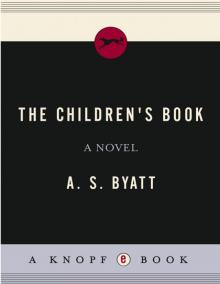 The Children's Book
The Children's Book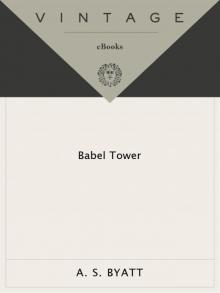 Babel Tower
Babel Tower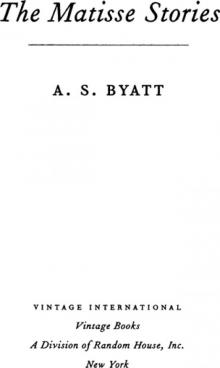 The Matisse Stories
The Matisse Stories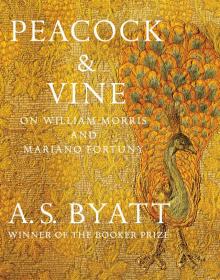 Peacock & Vine: On William Morris and Mariano Fortuny
Peacock & Vine: On William Morris and Mariano Fortuny Elementals: Stories of Fire and Ice
Elementals: Stories of Fire and Ice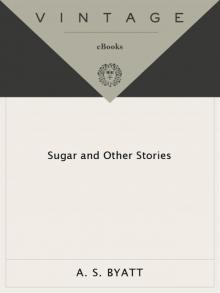 Sugar and Other Stories
Sugar and Other Stories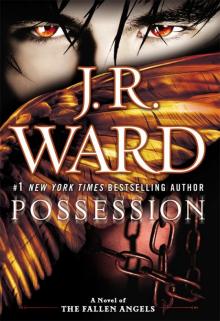 Possession
Possession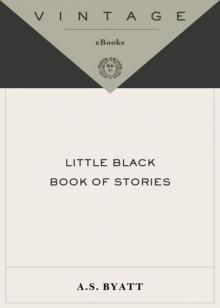 Little Black Book of Stories
Little Black Book of Stories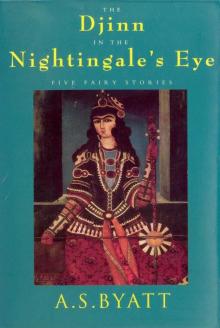 The Djinn in the Nightingale's Eye
The Djinn in the Nightingale's Eye The Virgin in the Garden
The Virgin in the Garden The Game
The Game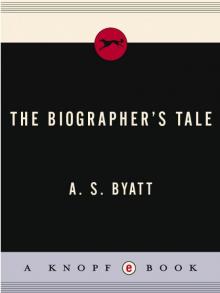 The Biographer's Tale
The Biographer's Tale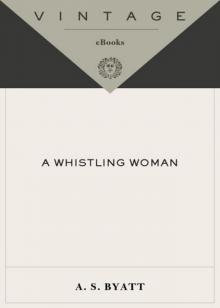 A Whistling Woman
A Whistling Woman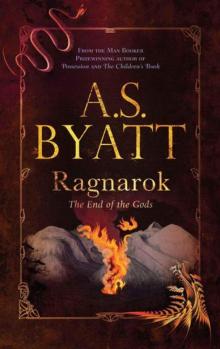 Ragnarok
Ragnarok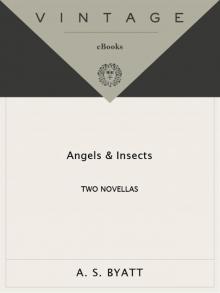 Angels & Insects: Two Novellas
Angels & Insects: Two Novellas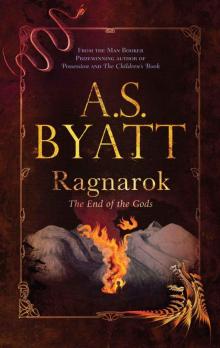 Ragnarok: the End of the Gods (Myths)
Ragnarok: the End of the Gods (Myths)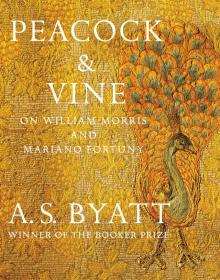 Peacock & Vine
Peacock & Vine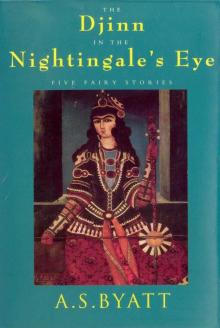 The Djinn in the Nightingale's Eye (Vintage International)
The Djinn in the Nightingale's Eye (Vintage International)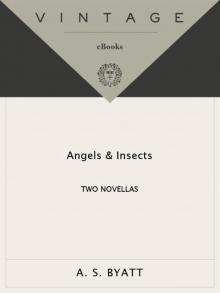 Angels and Insects
Angels and Insects The Arabian Nights: Tales from a Thousand and One Nights (Modern Library Classics)
The Arabian Nights: Tales from a Thousand and One Nights (Modern Library Classics) Elementals
Elementals